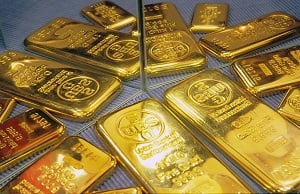 As Greece's financial crisis continues to deepen, gold purchases are surging.
As Greece's financial crisis continues to deepen, gold purchases are surging.
Greece has capped cash withdrawals to keep banks from collapsing after Greeks dashed to yank money out of ATMs following the referendum call at the start of the weekend. The maximum withdrawal amount has been set at 120 euros ($134) for the week, after the government reopened some banks Wednesday to help pensioners who don't have bank cards. Greeks are limited to daily ATM withdrawals of 60 euros ($67) and cannot send money abroad without special permission.
Investors across Europe are reacting by buying gold.
Online retailer CoinInvest.com reported gold coin sales spiked Monday to the highest level since Cyprus limited cash withdrawals in 2013, according to Bloomberg. Buying was brisk from customers in Germany, France, and Greece.
Bullion dealer GoldCore Ltd. told Bloomberg coin and bar demand rose "significantly" on Monday. Sales to the U.K. and Ireland jumped roughly three times the average for the past three Mondays, the Dublin, Ireland-based company said.
The U.K. Royal Mint said demand from Greek customers for Sovereign gold coins was double the five-month average in June.
U.S. Mint bullion sales also soared on Monday. Every available precious metal coin enjoyed increased sales. Gains included 11,000 ounces in gold coins and 1.15 million in American Silver Eagles. The Silver Eagle increase was the biggest since Jan. 12, the day the 2015-dated version debuted.
Additionally, global assets in gold exchange-traded funds (ETFs) have risen. Assets in ETFs rose by 6.3 metric tons last week, the biggest addition since Feb. 6, according to data from Bloomberg.
Buying Gold: Safer than Money in the Bank
Gold has historically been the go-to, safe, tangible commodity in times of turbulence. Interest in gold as a real money alternative has been stoked anew amid Greece's banking situation and Puerto Rico's looming $72 billion default.
Even global central banks recognize the benefits of gold and continue to be robust buyers.
Central banks have been net buyers of gold for 15 straight quarters, according to the World Gold Council. Last year, the world's central banks bought 477 tons, a 17% year-over-year increase. That marked the second-highest year of central bank net purchases for 50 years, second only to the 544 tons added to global gold reserves in 2012.
For 2015, the WGC expects central banks to be net buyers for the sixth year in a row with more than 400 tons of gold purchases.
Also expected to be buying gold in a big way this year is India, which accounts for as much as 25% of the world's gold consumption. Pent-up demand has surfaced since late last year when the Reserve Bank of India dropped rules requiring importers to sell 20% of shipments to jewelers for re-export.
Peak Indian demand will come in September after the monsoon season ends. A flurry of weddings and festivals follow the rainy season, occasions when it is considered lucky to buy and give gold. A heavy rainfall, critical for the success of rice crops, will be key.
How to Buy Gold for Protection in Any Crisis
Everyone has their own preferences for investing in gold. If you're relatively new to investing in and buying gold, here are some resources to get started:
- Money Morning Chief Investment Strategist Keith Fitz-Gerald showed investors a "cheat sheet" for how to figure out how much gold to own. Go here to access that gold investing tool.
- ETFs are indeed among the easiest ways to invest in gold. There's no delivery risk or charge, no insurance fee, they're liquid, and ETFs can be bought and sold easily through any online brokerage. Here we explain why to buy a gold ETF in 2015.
- For those who like mining stocks, Money Morning Resource Specialist Peter Krauth details here why Goldcorp stock is a buy today.
- Here we show you how to buy one ounce of gold at a discount.
- For more on how to profit from alternative investments today, read How to Buy Gold in the 21st Century.
Stay informed on what's going on in the markets by following us on Twitter @moneymorning.
Related Articles:
- World Gold Council: Gold Demand Trends 2014
- United States Mint: Numismatic Sales Report
- Bloomberg: Europeans Rush to Gold Coins as Bank of Greece Stops Sales


